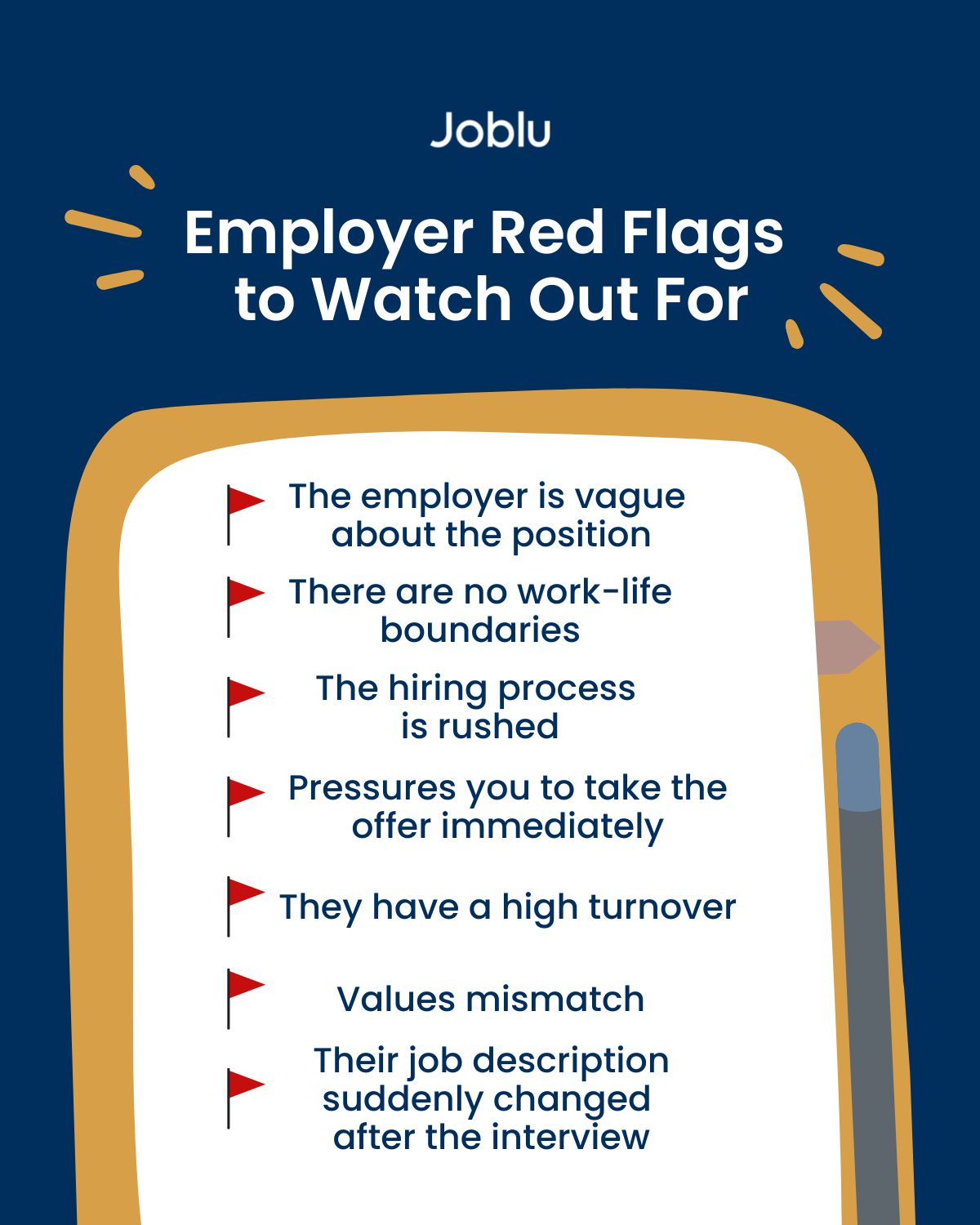Much has been written about the red flags employers need to look out for when looking for job candidates, but have you ever thought about what it’s like when the shoe is on the other foot? From having a bad feeling about a job interview to receiving a job offer that doesn’t feel right, there is a lot of employer red flags you need to be extra cautious about before you commit to accepting a job offer.
Truth be told, you’re interviewing your prospective employer just as much as they’re interviewing you. And if they’re waving more red flags, chances are you’ll soon regret taking the job. So, when you’re going through the process of looking for your dream job, read on to know what to watch out for before you sign a job offer.
Table of Contents
Traits of a Good Employer

Being a good employer means creating a culture where employees feel valued and want to help you succeed. Doing it right is easier than you may think. To help you identify what exactly a good employer is, here are some of their traits:
They’re open and honest communicators
Great employers let their employees know what’s going on with the business. They explain its mission and short-term and long-term goals. They also regularly let employees know how the business is doing. With this, employees feel more secure, and help them identify with the company’s mission and values.
They’re flexible
A good employer is open to alternative arrangements, such as letting employees work from home, or offering part-time opportunities, as long as the employee gets the job done. This sends a message that they want employees to lead well-rounded lives and that you trust them to do their work, even when they’re not watching.
They know how to listen
Great employers know that they aren’t always right, so they welcome ideas and insights from employees about how to make the company even better. They listen to employee complaints and offer well-thought-out, empathetic and genuine responses. This is one of the top ways employers can empower their employees.
They pay a decent wage
People work for all sorts of reasons, but the main one is to earn. Employers cannot expect to be considered a great one if they don’t pay well. It need not be above the norm for your industry, just a good, honest, and fair wage is enough.
List of major employer red flags to spot

When searching for a job, it can be hard to tell which employers have the best intentions. Some company red flags are easy to recognize and you can spot them right away, but some are harder to detect. They can also differ from each employer, so pay attention to the signs and use your instincts to make your decision.
1. The employer is vague about the position
If a company is vague about something from the start, chances are, they are hiding something that they know isn’t desirable to applicants. Employers should know all about the role that they are recruiting for.
2. There are no work-life boundaries
If you are expected to be available at all times, or you are asked if you are willing to put in the time to get things finished, then, they want to know if you are willing to work unpaid overtimes, and may demand it in the future. There should be a clear structure for work hours, training hours, and learning hours.
3. The hiring process is rushed
Some interview processes are long because employers want the best employee to fill the role they are paying them for. If it seems to be rushed or you are offered a job on the spot, you might have to think about why. Are they desperate to fill the role because people leave faster than they recruit? Are vacancies related to layoffs? Give yourself a chance to think about the terms of the job and decide if it’s the right role before you accept.
4. They are pressuring you to take the offer immediately
If the employer is pressuring you to accept the job immediately, then that’s a red flag right there. They might be trying to hide something or are desperate to fill the job because of high turnover. That doesn’t mean they should give you weeks to decide, but just ask for more time if you need it.
5. They have high turnovers
Some fields have high turnovers, especially when it’s an entry-level. But be wary of workplaces that are constantly looking to fill the same position repeatedly. Ask around to see if anyone knows someone who works at the company that you’re applying for. Try to chat with a current employer before the interview to get some insights into the company and what you might expect.
6. Values mismatch
From the very start, you must be clear what your most important values are. You may have questions ready to assess the company’s culture, the extent to which they can understand your most deeply held values, and how you’d be able to express these values on the job.
7. Their job description suddenly changed after the interview
Sure, change is constant. However, if the hiring manager explicitly highlights or calls out the change, it can indicate that they don’t communicate or manage change well, both internally and externally.
Benefits of Strong Employer-Employee Relationships
Employee relations can make or break an organization. Great employee relations make a business successful in the long run, and a positive relationship between them leads to higher motivation and employee engagement. When employees are happy, they are more productive. They will put more effort into their work, and this translates into satisfied customers and more revenue.
While developing and maintaining good employee relations can be challenging in most workplaces, healthy relationships are beneficial not only to the individuals but to the entire organization. Managers should set a good example and have a good working relationship with their employees to help establish a culture that encourages great employee relations.
Committing to a job is a big decision. Be sure to do your research, ask questions throughout the process, and carefully review your offer letter. If the potential job has one or more warning signs, pulling yourself out of consideration or rejecting the offer may be something to consider. The ultimate goal is to know what you’re getting into before it’s too late.
Don’t settle for anything less when it comes to opportunities. Find meaningful jobs that align with your cultural beliefs and values. Download the Joblu app now and start swiping for jobs.
Frequently Asked Questions About Employer Red Flags
Q: What are some red flags in a job?
A: Dig deeper into your interviewer and company culture, then you’ll be able to determine if the company is the right fit for your long-term goals.
- The employer is vague about the position
- There are no work-life boundaries
- The hiring process is rushed
- They are pressuring you to take the offer immediately
- They have high turnovers
- Values mismatch
- Their job description suddenly changed after the interview
Q: What are some hiring red flags?
A: Perhaps one of the most common job search red flags is a hiring process that’s too long, too short, or has a general lack of consistency.
Q: How do you know if a job is a red flag?
A: If you’re dealing with a negative workplace culture, it might not be doing you, your career, or your personal life any favors.